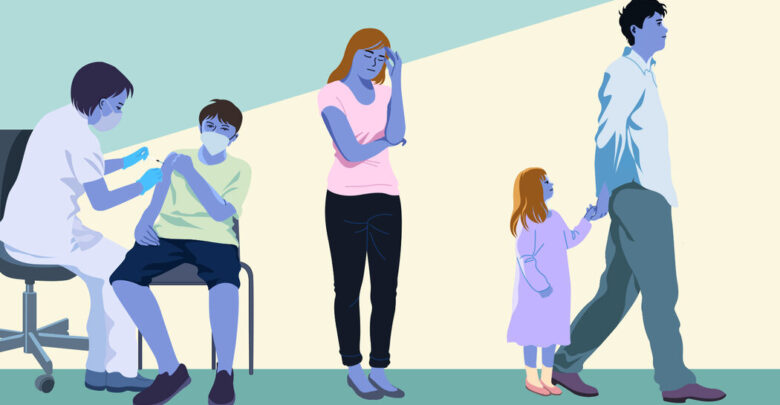Covid Vaccines for Kids Are Dividing Divorced Parents

As soon as the shot was made available, Mr. Rogers filed an application for a family court hearing and marked it ex parte, or urgent. The judge didn’t agree on the urgency.
Updated
April 4, 2022, 11:14 a.m. ET
“It was rubber-stamp denied, quite literally, with a stamp on it that said ‘no exigent circumstances,’” Mr. Rogers said. “And I was like, of course there are exigent circumstances. We have a global pandemic, we have to get these kids vaccinated ASAP.”
When contacted, Mr. Rogers’ ex-girlfriend declined to comment.
But at a court hearing in mid-February, the judge granted Mr. Rogers decision-making power over issues of vaccination, and the boy is now vaccinated. “It’s really whatever the judge says. Whatever this one man thinks, that’s what goes,” Mr. Rogers said, pointing out that he still doesn’t fully understand why he was able to move forward.
That sort of clarification is necessary, said Tim Miranda, founding partner of Antonyan Miranda, a family law firm in San Diego. “If the court doesn’t make a specific order about things like medical care, then both parents can individually take whatever action they would like in that realm.” Parents who are currently navigating the custody process should be clear with their legal teams if they disagree with the vaccination stance of their ex, said Mr. Miranda, and be prepared to argue as to why they, and not the other parent, should be vested with medical decision-making powers for their child. They should also be sure that their pediatrician or therapist has views that align with their own.
“The courts give a lot of credence to the treating therapist or doctor, because they’re the ones dealing within the realm of the patient,” Mr. Miranda said. “The standard is to decide what is in the best interest of the child.” If parents can’t come to a mutual agreement over what “best interest” means, however, courts generally opt to grant one parent power to make the decision, as they did with Mr. Rogers.
Laws vary slightly from state to state, Mr. Miranda said, but in general, “it’s a pretty high bar with something like a vaccination. If you’re going to oppose it, you’d have to have a pretty good reason, like a religious conviction or a medical condition.”
The American Academy of Pediatrics does not have an official stance on vaccinating children in situations of custodial disputes, said Dr. Tiffany Kimbrough, an A.A.P. member and medical director of the mother-infant unit of the medical center at Virginia Commonwealth University. (They do, however, state, “It is prudent for the physician to inquire about marital status and custody issues when relevant” in this 2017 report.)



